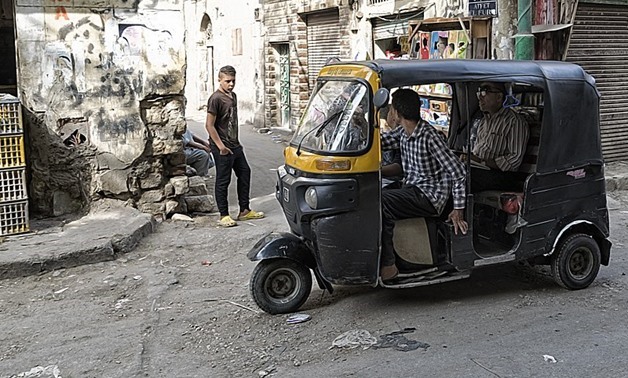
Toktok driver in old cairo – Wikimedia Commons/Wael Kenawey Photography
CAIRO -30 November 2018: Prime Minister Mostafa Madbouli directed governors to stop issuing new licenses for the auto rickshaws known in Egypt as "toktoks" temporarily to treat negative impacts of the three-wheel transportation means.
The decision comes, according to Madbouli, to limit the bad phenomena that resulted from the uncontrolled spread of the toktoks. Madbouli added that he directed decisive dealing with abusers including the confiscation of violating toktoks.
This came during Madbouli's meeting with the governors in the Local Development Ministry's headquarters.
During the meeting, Madbouli said that the state has shown some flexibility concerning toktoks in some areas that need such means of transportation. However, many recent studies have warned that many young people have been encouraged to work in this field rather than other serious jobs that can help develop and build the country.
Madbouli also pointed out to the danger that toktoks impose by attracting many children to work in this field, and subsequently gain money which they spend unwisely due to their young age.
The developed three-wheel auto rickshaw, known in Egypt as toktok, has drawn controversy in the country since it appeared across its cities in 2005. However, some people think satisfying alternatives have not yet been given.
Toktoks have been seen as double-edged swords. People inhabiting slums, humble regions and even some classy districts think they are comparatively cheap, fast, widespread and available. Although this can all be real, others still believe they are dangerous as the majority of toktoks have been so far unlicensed, and can consequently be used in committing crimes.
A toktok is a common form of urban transportation. It is a development of the still available two-wheeled pulled rickshaw by which a runner draws a cart with a seat for one or two people. It is believed the pulled rickshaw was invented by Japan in the 19th century. Rickshaws then appeared in India, China and other big cities in Asia.
Bad record
Secretary of the Parliament’s Transportation Committee, Khaled Abdel Azeem, criticized the government in February for not taking actual steps to stop toktoks from plaguing Egyptian communities and turning them into slums.
The government could not set up an integrated plan to face the unjustified spread of toktoks, according to Abdel Azeem, although the government has warned repeatedly of the dangers toktoks pose to society.
Abdel Azeem wondered why the government has not applied the Industry Ministry’s 2014 decision to stop importing toktoks so as to take the first step towards ending the phenomenon. The ministry had decided in 2014 to ban toktoks for a year as it had been used in crimes and terrorist attacks, according to the government.
In November 2017, a toktok caused the death of seven students when it plunged off a road into a conduit in Beheira governorate, Delta.
In September of the same year, while a police force was patrolling a town in Assiut, it suspected three people on a toktok, the ministry said in a statement. The three men opened fire at the force when it stopped them, according to the ministry. The force returned fire, killing one and wounding another. The third fled.
In the same month, a girl was killed and two others were severely injured after a toktok collided with a passenger train in Dishna, Qena, while trying to pass a railway crossing.
The U.S. Embassy in Colombo warned its citizens who were visiting Sri Lanka in June 2017 to avoid travelling alone in toktoks after a spate of sexual harassment complaints.
"The U.S. Embassy in Colombo has been made aware of an increase in incidents involving toktok drivers in the Colombo area inappropriately touching female passengers," the embassy said in a statement.

Comments
Leave a Comment